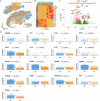IgG autoantibodies in bullous pemphigoid induce a pathogenic MyD88-dependent pro-inflammatory response in keratinocytes
- PMID: 40769980
- PMCID: PMC12329039
- DOI: 10.1038/s41467-025-62495-2
IgG autoantibodies in bullous pemphigoid induce a pathogenic MyD88-dependent pro-inflammatory response in keratinocytes
Abstract
Autoantibodies in bullous pemphigoid (BP) are known to activate the innate immune response. Nevertheless, the direct effect of autoantibodies on keratinocytes and the contribution of keratinocyte responses to the pathology of BP are largely unknown. Here, by performing multiplex immunoassays and RNA-seq on primary keratinocytes treated with IgG derived from BP patients, we identify a MyD88-dependent pro-inflammatory and proteolytic response characterized by the release of several cytokines (IL-6, IL-24, TGF-β1), chemokines (CXCL16, MIP-3β, RANTES), C1s, DPP4, and MMP-9. The activation of this MyD88-dependent response is further validated using spatial transcriptomics and scRNA-seq of diseased skin. Blistering of the skin appears to significantly impact this inflammatory response, with attached BP skin and spongiotic dermatitis revealing indistinguishable transcriptomes. In a preclinical mouse model of BP, Krt14-specific Myd88 knockout significantly decreases disease severity and reduces serum levels of IL-4 and IL-9, indicating a contributory role of keratinocyte-derived skin inflammation in the systemic response. Thus, our work highlights key contributions of keratinocytes in response to autoantibodies in BP.
© 2025. The Author(s).
Conflict of interest statement
Competing interests: This work was supported by Astra Zeneca. A.M., C.M. and C.N. are past or present employees of AstraZeneca and may hold stock and/or stock options or interests in the company. E.S. has a scientific cooperation with Astra Zeneca and received consulting fees from Astra Zeneca (both not related to the present project). The remaining authors declare no competing interests.
Figures







Update of
-
IgG autoantibodies in bullous pemphigoid directly induce a pathogenic MyD88-dependent pro-inflammatory response in keratinocytes.bioRxiv [Preprint]. 2024 Oct 11:2024.10.07.616103. doi: 10.1101/2024.10.07.616103. bioRxiv. 2024. Update in: Nat Commun. 2025 Aug 6;16(1):7254. doi: 10.1038/s41467-025-62495-2. PMID: 39569141 Free PMC article. Updated. Preprint.
References
-
- Amber, K. T., Murrell, D. F., Schmidt, E., Joly, P. & Borradori, L. Autoimmune Subepidermal Bullous Diseases of the Skin and Mucosae: Clinical Features, Diagnosis, and Management. Clin. Rev. Allergy Immunol.54, 26–51 (2018). - PubMed
-
- Bao, L. et al. FcRn inhibition reduces bullous pemphigoid anti-basement membrane zone IgG deposition and blistering in 3D human skin equivalents. J. Invest. Dermatol.144, 2809–2812.e2 (2024). - PubMed
MeSH terms
Substances
Grants and funding
LinkOut - more resources
Full Text Sources
Medical
Molecular Biology Databases
Research Materials
Miscellaneous

